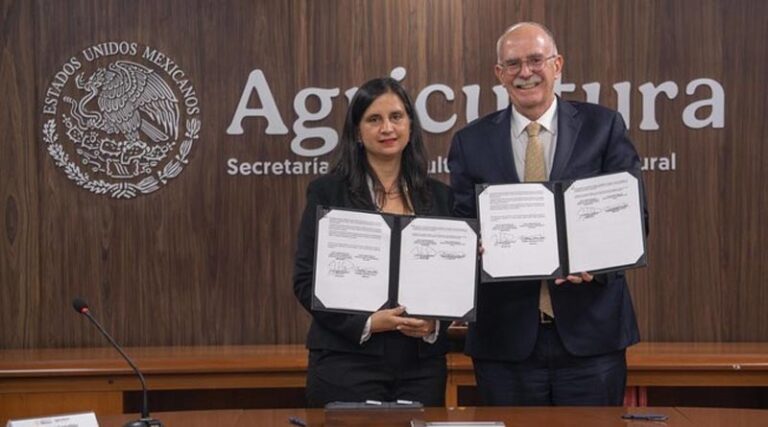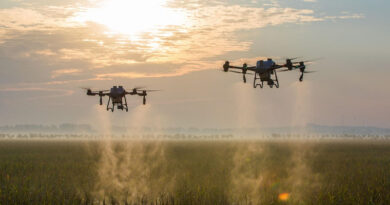
Mexico And Chile Strengthen Agri-food Cooperation With Agreements On Health, Science, And Fair Trade
24 September 2025, Mexico: The Secretariat of Agriculture and Rural Development (AGRICULTURA) of the Government of Mexico and the Ministry of Agriculture of the Republic of Chile held a high-level meeting, led by the Secretary of Agriculture, Julio Berdegué Sacristán , and the Minister of Agriculture of Chile, María Ignacia Fernández Gatica, in which they signed a General Agreement on Technical and Scientific Cooperation and a Specific Agreement on Plant Health . They also agreed on a work plan to accelerate joint projects, facilitate agri-food trade, and strengthen health security for the benefit of producers in both countries.
Federal Secretary Julio Berdegué welcomed this instrument, which reflects the interest in boosting the primary sector and addressing challenges, particularly those related to climate change, in both countries. “President Claudia Sheinbaum Pardo’s instruction is to deepen and advance this relationship with Latin American countries, and particularly with Chile, because we have a very deep history of relations.”
He expressed confidence that the signing of this agreement will open the door to concrete and practical collaboration on various issues related to the agricultural sector. “It doesn’t have to be limited to trade; we also have common interests in environmental matters, water resources, family farming, and the growing scarcity of water,” he explained.
For her part, Minister María Ignacia Fernández stated that “in a challenging context, Chile and Mexico are strengthening their shared agenda—technical and scientific cooperation, plant and animal health, and trade facilitation (electronic certification)—under sustainable standards. We reaffirm agriculture as a pillar of regional integration and inclusive development, with a focus on small producers, rural women, and sustainable food systems.”
The agreements signed are detailed below:
- General Agreement establishing the framework for collaboration in animal and plant health; science and technology; water efficiency; family farming; sustainable production systems; climate change; and pesticide management. It includes information and technology exchange, technical visits, training, and joint publications.
- Specific (health) agreement between the National Service of Health, Safety and Agri-Food Quality (Senasica) and its counterparts, the Agricultural and Livestock Service (SAG) and the Institute of Agricultural Research (INIA), with technical work on pest management, use of smart traps for the Mediterranean fruit fly, and alternatives to methyl bromide.
In addition, both delegations reviewed the status of current health protocols and agreed on concrete steps to continue facilitating safe trade. The continuation of the pilot plans for risk mitigation measures using a systems approach for table grapes and kiwifruit was confirmed. These plans will be subject to a joint technical evaluation in 2026, with the aim of consolidating mutual learning and strengthening mutual trust.
Chile also reiterated its interest in expanding access to Mexican mangoes and continuing the process of licensing meat establishments, while Mexico recognized the value of these efforts to diversify and balance trade flows. Regarding trade facilitation, the parties highlighted the successful implementation of electronic certification for plant products and agreed to move toward its implementation for livestock products, within the framework of the Pacific Alliance, as a tangible benefit for exporters and importers of both nations.
Secretary Julio Berdegué Sacristán and Minister Ignacia Fernández Gatica reaffirmed Mexico and Chile’s commitment to strengthening bilateral cooperation, prioritizing two strategic areas: promoting sustainable and climate-resilient livestock farming, with full incorporation of the gender perspective, and promoting efficient water management as a basis for sustainable and inclusive rural development.
Both parties agreed that mechanisms such as the Mexico-Chile Joint Fund are key tools for consolidating initiatives that strengthen good practices and public policies for the benefit of both countries.
Both the Mexican Federal Secretary of Government and the Chilean Minister of Agriculture were accompanied by their respective technical teams, including Senasica, the National Institute of Forestry, Agricultural and Livestock Research (INIFAP), as well as representatives from SAG and the Chilean private sector.
Also Read: Two Rows of Grapes, Two Different Futures: How Biostimulants Are Reshaping Farming
📢 If You’re in Agriculture, Make Sure the Right People Hear Your Story.
From product launches to strategic announcements, Global Agriculture offers unmatched visibility across international agri-business markets. Connect with us at pr@global-agriculture.com to explore editorial and advertising opportunities that reach the right audience, worldwide.






